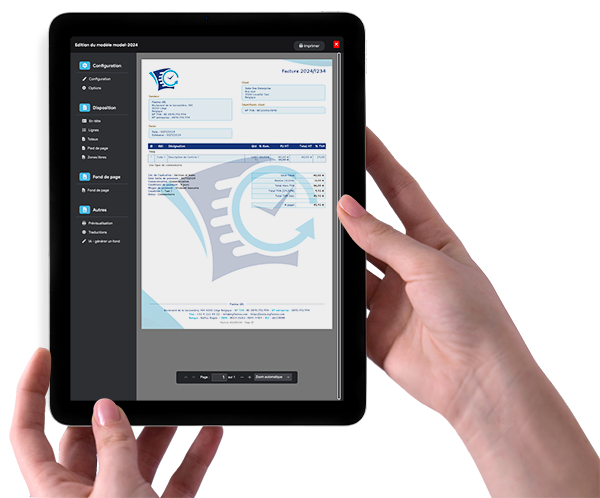If a company registered and domiciled in Belgium wishes to establish an invoice to a client from abroad, it can obviously write it in a foreign currency. However, certain obligations apply to these invoices intended for the European Union or internationally, particularly regarding currency, conversion rate or VAT application according to the destination country.
Creating an invoice for a foreign supplier
Indicating a foreign currency
The conditions for affixing a currency other than the Euro, such as the Dollar or Pound Sterling, on an invoice intended for abroad must be rigorously respected. Thus, if this is necessary for your business, another currency may be indicated, provided that:
- the currency is convertible to euros, we speak of a "mutable" currency;
- the currency respects the ISO4217 standard and thus has 3 letters (like EUR or CHF), this proves that it is internationally recognized.
Writing in another language
It is possible that your business addresses an invoice to abroad, either in the language of the country where your customer is located, or in English as an international language. However, you will need to make a copy in French by using the services of a certified translator, so that everything is compliant in case of control by the Belgian tax administration.
Managing a commercial operation in a foreign currency
Whether it's a long-term commercial contract or a one-time sale of products or services to a foreign client, commercial operations will probably lead to the creation of an invoice in a currency other than the euro. If this is the case, the invoice intended for abroad must follow these two rules:
- the invoice must indicate the exchange rate in euros negotiated between you and the client, which will serve as a parity reference between the two companies. Both parties thus agree on a rate where each avoids being a loser;
- the invoice intended for abroad will be recorded in your invoicing software, indicating the amount in euros. The conversion rate may or may not follow the one used during the commercial operation.
Which date to choose for the conversion rate?
To choose the conversion rate to apply to your invoice intended for abroad and to record scrupulously, you can choose between 2 dates, and thus 2 rates more or less advantageous for you:
- the day of the Customs conversion rate during the second-to-last Wednesday of each month;
- the day when your company must pay all the VAT collected to contributions, the VAT due date.
Properly applying VAT in the case of service sales abroad
For your invoices intended for abroad, the rules will change depending on whether the recipient company or individual is within the European Union or not. Thus, after clearly defining your position in this commercial operation (provider or recipient), the country and status of your customer (company form and size) and finally the nature of the services, you will be able to find the appropriate invoice establishment rules.
VAT for a client outside the European Union and/or non-taxable
In the case where your company should make an invoice to abroad outside the European Union or to non-taxable recipients (self-employed or individuals), the VAT applicable in Belgium must be integrated into the net amount to pay. Indeed, in this case the VAT rate corresponds to that of the country where the service was performed. It will therefore be useless for you to make a declaration to the customs service.
As an example, a Belgian taxable company that would provide its marketing consulting services to a non-VAT taxable company located in Germany, must invoice the cost of its services + VAT at the rate of the service provider country (here Belgium). The invoice will therefore include a net amount to pay of 1,800 euros (including 300 VAT), as well as the legal mention indicating its intra-community VAT number.
VAT between European Union taxable persons
For a service sale on your part, intended for a taxable company located within the European Union, the VAT to apply on your invoice to abroad will be zero. The amount to invoice will thus be indicated excluding tax, in the form of reverse charge. The recipient (the foreign company that buys your service) can pay the VAT at the rate of their country's tax administration.
The invoice sent abroad must mandatorily include:
- The intra-community VAT of both parties;
- The legal mention "reverse charge by the recipient art 283-2 of CGI" or more rarely "Art.44 Directive 2008/8".
Note that for such an invoice, it is essential to declare it via a European Service Declaration on the customs website within ten working days of the following month.
Again as an example, a Belgian company still subject to VAT provides management consulting services to an Italian company also subject to tax. The Belgian company must thus provide an invoice with a net amount to pay of 1,500 euros excluding tax, taking care to indicate the intra-community VAT number of both parties, as well as the mention concerning reverse charge.
Attention, exceptions exist concerning localizable services, such as on-site catering or services attached to a building such as architecture or concierge. Thus, VAT is always applicable.
Let's go! Now that you have all the keys in hand to establish invoices to abroad, you can now expand your prospecting field!
Don't wait any longer and come share your experiences and impressions in the comments, we will be happy to respond. Don't forget to test our online invoicing software for free for 15 days. If you have questions or need help, you can also contact us.




